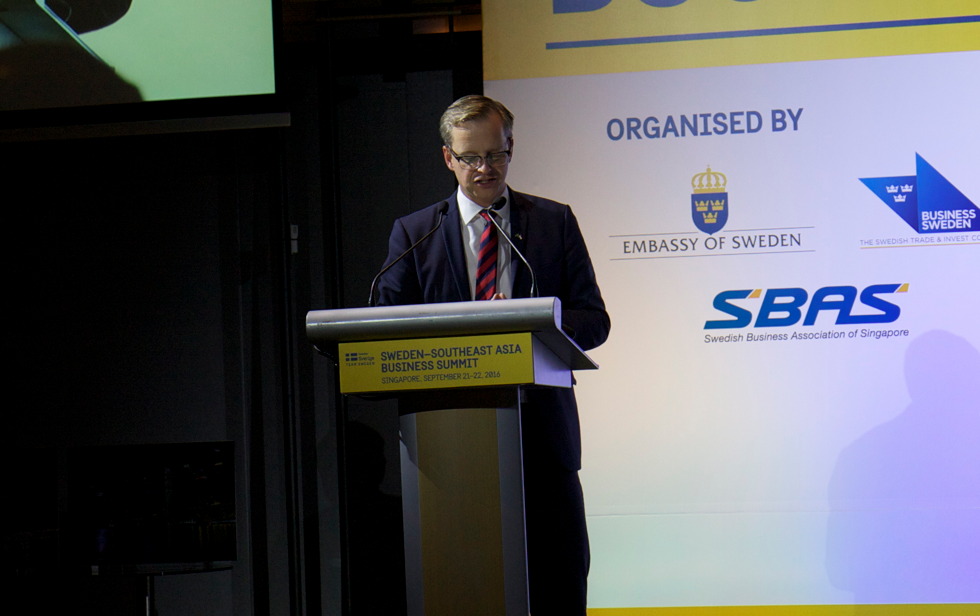
Coinciding with the inaugural Sweden-Southeast Asia Business Summit, held during 21-22 September 2016 in Singapore, the Swedish Government’s highly relevant new industrialisation strategy was also highlighted by no other than Sweden’s Minister of Enterprise & Innovation Mikael Damberg, who was in attendance.
This strategy is described as crucial for Sweden’s competitiveness and international trade/export going forward.
“Sweden’s prosperity is built on innovative and successful export companies that time and again have managed to renew and reorganise production and products to keep pace with changing markets”
“Continued success, however, require that our existing companies keep adopting, with continued investment. Our continued ability to change and adapt is crucial and therefore the Swedish government earlier in the year launched the Smart industry strategy,” announced the minister.
In 2016 the Swedish Government has taken action to strengthen the development of Swedish industry. This strategy is the answer, aiming to strengthen the industrial sector’s competitiveness and reinforce Sweden’s position as an attractive location for industrial production. Sweden will become a world leader in the innovative and sustainable production of goods and services. Sweden’s industrial sector will increase its competitiveness and participation in global value chains, primarily in the high value-added segments.
“The capacity for innovation that the employees and companies in the industrial sector and the industry-related services possess still forms the bedrock of Sweden’s prosperity. This may seem obvious. But for too long, the Swedish industrial sector has been treated as a historical remnant on the path towards the post-industrial service society. And this has come at a cost. When the full impact of the financial crisis hit the economy, there was a lack of desire to mitigate the consequences and many jobs were lost in Sweden. There was significantly more resolute action in many of the countries with which we compete,” he previously has said about the strategy.
The strategy is described as an important stage of the effort to benefit from the window of opportunity for new industrialisation that is now open to Sweden.
There are four focus areas of particular importance:
- Industry 4.0 – Companies in the Swedish industrial sector are to be leaders of the digital transformation and in exploiting the potential of digitalisation.
- Sustainable production – Increased resource efficiency, environmental considerations and a more sustainable production are to contribute to the industrial sector’s value creation, job creation and competitiveness.
- Industrial skills boost – The system for supplying skills is to meet the industrial sector’s needs and promote its long-term development.
- Test bed Sweden – Sweden is to lead research in areas that contribute to strengthening the industrial production of goods and services in Sweden.

Digitalisation is changing everything. Digitalisation is resulting in enormous opportunities to develop a new, smarter and more sustainable industrial sector.
“The Swedish industrial sector is faced with challenges. Digitalisation is pushing the industrial sector’s already high rate of transformation even further, paving the way for new business models and making others redundant. For small companies in particular, it is an enormous challenge to keep up with the pace of technological development.”
“The Government’s strategy for new industrialisation is to strengthen companies’ capacity for change and competitiveness. It is an important stage of the effort to benefit from the window of opportunity for new industrialisation that is now open to Sweden. Rapidly rising wage costs and problems with the environment, quality and long lead times in the former low-cost countries in Asia have made Swedish production of goods and services more competitive. At the same time, automation and digitalisation are bringing with them new opportunities for profitable and sustainable production in a completely new guise – connected, more automated and knowledge-intensive. Sweden now has the upper hand and it is high time that the industrial sector was prioritised.”
“The digitalisation of the industrial sector’s production, products and capacity to transform enormous quantities of data into new businesses is completely vital to the industrial sector’s future competitiveness. But the perspective needs to be wider than this. This is because ever greater demands are simultaneously being placed on the long-term sustainability of production and the utilisation of resources. That is why Sweden’s strategy for new industrialisation aims beyond connected industry and also encompasses the ambition to cope with the demand for renewal that growing sustainability requirements are placing on the industrial sector and its products,” states Minister Mikael Damberg.
In a concerted national effort Sweden will take action to facilitate structural transformation in the industrial sector. The tools will include laws and regulations, investments in enterprise, education and innovation, public procurement and opening up the public sector, providing testbeds and open data. The strategy is supported by an action plan, which will be published on the Swedish Government website and updated continuously.


